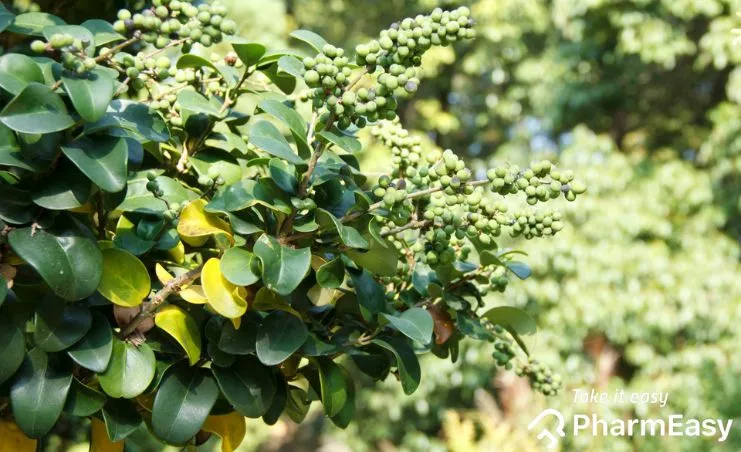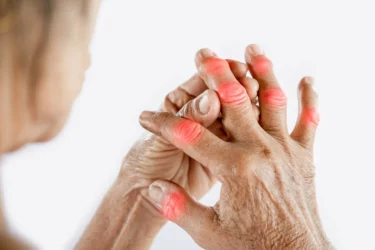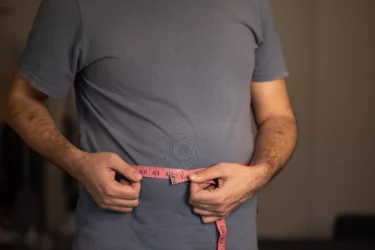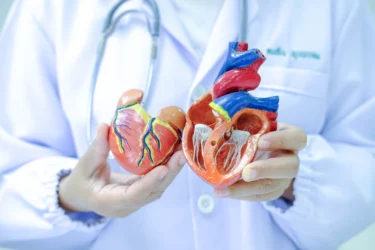Guggul: Uses, Benefits, Side Effects and More!
By Dr Anuja Bodhare +2 more

Get,

to manage your symptom
Get your,


4 Cr+ families
benefitted

OTP sent to 9988776655



You’ve successfully subscribed to receive
doctor-approved tips on
Whatsapp

Get ready to feel your best.

Hi There,
Download the PharmEasy App now!!


Register to Avail the Offer
Send OTPBy continuing, you agree with our Privacy Policy and Terms and Conditions

Hi There,
Sign up on PharmEasy now!!
Trusted by 4 crore+ families

OTP sent to 9988776655



You have unlocked 25% off on medicines




Code: NU25
By Dr Anuja Bodhare +2 more
Table of Contents
Guggul is an oleo-gum resin obtained from the bark of Commiphora wightii and belongs to the family Burseraceae. It is obtained as an exudate from the tapping of branches and stems of the guggul tree. It is found in dry areas of India, Pakistan, and Bangladesh. In India, it is found in Gujarat, Assam, Rajasthan, Karnataka, and Madhya Pradesh1. The guggul tree is a small, bushy tree and has thorny branches. It makes yellowish gum resin in small ducts found all over its bark. The guggul tree is hit by making a cut on its bark, due to which the resins flow out and are allowed to harden before they are collected1. Guggul has been used in the Indian traditional system for thousands of years to manage inflammation, gout, rheumatism, arthritis, obesity, and lipid metabolism disorders. It is also known as Guggula, Gugar, Guggal, and Indian bdellium1.

Other vernacular names of guggul are:
Guggul is an oleo gum resin and contains gum, resin and volatile oils (small quantity). It contains amino acids, sugars, essential oils, flavonoids, cembrene, camphorene, allycembrol, and ellagic acid3.
Guggul has the following therapeutic properties4:
Guggul possesses many properties, which may show potential uses against many disease conditions.

Several studies1 have confirmed that guggul is beneficial for arthritis and inflammation and has anti-inflammatory and anti-arthritic activity. The guggul extract was evaluated for anti-arthritic activity in various animal models. It was found that it blocked the disease’s development and lowered the severity of the disease. Several studies have confirmed that guggul might be helpful for arthritis and inflammation and show anti-inflammatory and anti-arthritic properties. The guggul extract was also evaluated for anti-arthritic activity in various animal models. In studies it was found that it blocked the disease’s development and lowered the effect of arthritis1. However, do not use guggul as an alternative to medicinal treatment. Talk to a healthcare provider before using guggul for arthritis.

In a study1 gugulipid (extract of guggul) was found to be effective in managing nodulocystic acne (a severe form of inflammatory acne that cauIn a study gugulipid (extract of guggul) was found to be effective in managing nodulocystic acne (a severe form of inflammatory acne that causes cysts and nodules on the face). In a human trial, too it was found to have some benefits for nodulocystic acne. The patients who had oily faces showed better results. However, talk to a skin doctor or specialist before using any herbal remedy on your face.
Over the years, I have observed that conditions like eczema and psoriasis, which involve inflammation of the skin, can be challenging to manage. However, I have found that Guggulu, a natural remedy, might offer some relief. Based on studies, using a cream containing Boswellia, an active component of Guggulu, can potentially reduce the reliance on corticosteroid creams and improve symptoms such as redness and superficial skin issues.
Dr. Rajeev Singh, BAMS

According to a study1 guggul showed a lipid-lowering effect in obesity and atherosclerosis (a condition where fat deposits in the arteries). The lipid-lowering effect of guggul was studied in animals as well as humans. Guggul contains bioactive compounds that might be responsible for hypolipidemic activity. You should talk to a healthcare provider before using any herb to manage weight. In addition talking to a dietician will help you make better dietary choices.

Guggulsterone (plant steroid) found in guggul may show the heart-protective property. Guggulsterone was tested in an animal model for heart protective activity. It was found to lower cholesterol, phospholipid, and glycogen levels and protect the heart against damage1. However, if you are suffering from heart problems, talk to a doctor and get a proper diagnosis and treatment.
In my experience, I have observed that Guggulu, a herbal remedy, may have potential effectiveness in managing asthma symptoms. It is believed that Guggulu’s anti-inflammatory properties could help reduce airway inflammation and improve respiratory function7.
Dr. Siddharth Gupta, B.A.M.S, M.D (Ayu)
Your Ayurvedic physician will prescribe the form and dose as per your requirement. Guggul can be used as:
You must consult a qualified doctor before taking guggul or any herbal supplements. Likewise do not discontinue or replace an ongoing modern medical treatment with an ayurvedic herbal preparation without consulting a qualified doctor.
Side effects associated with guggul use are:
Before using guggul or any herbal remedy, consult your doctor about the side effects associated with its use. It will help you make well-informed choices about your health.
Even though guggul is generally considered relatively safe, it is better to use it with caution1:
Also, before taking guggul for its health benefits, consult your healthcare provider about the possible precautions associated with its use.
Gugulipid (guggul extract) may interact with blood pressure medicines like diltiazem and propranolol. It reduces the absorption of these medicines. Taking guggul along with these medicines may lower the effectiveness of these drugs6. If you are taking any medicines, talk to your healthcare provider about the possible interactions of the treatment with other herbs and drugs. This will help you avoid unwanted side effects and interactions.
Also Read: Kutajarishta: Uses, Benefits, Side Effects, and More!
Guggul might help deal with obesity. It has been used in Ayurveda for several years for managing obesity1. However, talk to a healthcare provider before using herbal remedies to manage weight.
Yes, guggul might be good for the heart as it may show heart-protective activity3. If you are experiencing any heart problems, consult a doctor and get a proper diagnosis and treatment.
There is no sufficient information about the safe usage of guggul during pregnancy. However, avoid taking guggul during this time to be safer. You must consult your doctor if you want to take guggul during pregnancy.
It is mentioned in Ayurveda that when raw guggul is taken, it may sometimes cause diarrhoea, skin rashes, headache, mild nausea, irregular menstruation and liver damage (at high doses). In addition, a study found that some people had temporary side effects like fatigue and stomach-related issues1. Therefore, before using guggul or any herbal remedy, consult your doctor about the side effects associated with its use.
Guggul may interact with blood pressure medicines like diltiazem and propranolol and may lower the effectiveness of these drugs6. Therefore, If you are taking any medication, talk to your healthcare provider about the possible interactions of the treatment with other herbs and medicines.
Guggul is good for arthritis. It showed anti-arthritic activity when tested in an animal model. However, its anti-arthritic activity in humans is yet to be tested1. You should talk to a doctor before using any herbal remedy for arthritis.
Guggul was found to lower cholesterol levels in an animal model1. However, its effect on humans is yet to be tested. Therefore, do not use it as an alternative to medicinal treatment. Talk to a doctor before you use guggul for managing cholesterol.
Yes, guggul is considered safe in prescribed doses, but some studies found few side effects associated with its usage. Therefore, it is best to consult a doctor before taking guggul1.
Disclaimer: The information provided here is for educational/awareness purposes only and is not intended to be a substitute for medical treatment by a healthcare professional and should not be relied upon to diagnose or treat any medical condition. The reader should consult a registered medical practitioner to determine the appropriateness of the information and before consuming any medication. PharmEasy does not provide any guarantee or warranty (express or implied) regarding the accuracy, adequacy, completeness, legality, reliability or usefulness of the information; and disclaims any liability arising thereof.
Links and product recommendations in the information provided here are advertisements of third-party products available on the website. PharmEasy does not make any representation on the accuracy or suitability of such products/services. Advertisements do not influence the editorial decisions or content. The information in this blog is subject to change without notice. The authors and administrators reserve the right to modify, add, or remove content without notification. It is your responsibility to review this disclaimer regularly for any changes.
Comments

Leave your comment...
You may also like
Comments